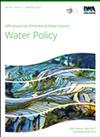Defining sustainability in agricultural water management using a Delphi survey technique
IF 1.8
4区 环境科学与生态学
Q4 WATER RESOURCES
引用次数: 0
Abstract
Sustainable water management measures are being developed to address the challenges posed by agriculture runoff and leaching on water resources. These measures are based on experts' opinions from various sectors and disciplines, ensuring that all stakeholders' perspectives are considered. For this, establishing a common understanding of 'sustainability' is essential to avoid misunderstandings, conflicts, and operational challenges. In this research, the Delphi survey technique was utilized to develop a definition of ‘sustainability’ in agricultural water management (SAWM) by considering the interdisciplinary group of experts from different parts of the world and those involved in a Horizon 2020 Research and Innovation Action. Twenty-six experts' perspectives on environmental, economic, and social dimensions of sustainability were assessed, and identified key concepts included climate change, water quality, water availability, stakeholder participation, capacity building, subsidies, and incentives. These concepts were used to define sustainability for multi/interdisciplinary project settings. The definition was validated with consortium members of the project in the regular consortium-wide meetings and used in the respective deliverables dealing with sustainability. The results serve as a foundation for communication between the involved actors and the project's definition of 'sustainability.' One recommendation from this work for broader policy formulation for SAWM in Europe is to prioritize farmer needs and focus on environmental sustainability.用德尔菲调查技术定义农业用水管理的可持续性
正在制定可持续的水管理措施,以解决农业径流和水浸对水资源造成的挑战。这些措施是基于来自不同部门和学科的专家意见,确保所有利益相关者的观点都得到考虑。为此,建立对“可持续性”的共同理解对于避免误解、冲突和运营挑战至关重要。在本研究中,通过考虑来自世界不同地区的跨学科专家小组和参与地平线2020研究和创新行动的专家,利用德尔菲调查技术来制定农业水管理(SAWM)的“可持续性”定义。26位专家对可持续发展的环境、经济和社会层面的观点进行了评估,并确定了气候变化、水质、水资源供应、利益相关者参与、能力建设、补贴和激励等关键概念。这些概念被用来定义多/跨学科项目设置的可持续性。该定义在定期的联盟范围会议上得到了项目联盟成员的验证,并用于处理可持续性的各自可交付成果中。这些结果作为参与者之间沟通和项目“可持续性”定义的基础。这项工作对欧洲更广泛的SAWM政策制定的一个建议是优先考虑农民的需求,并关注环境的可持续性。
本文章由计算机程序翻译,如有差异,请以英文原文为准。
求助全文
约1分钟内获得全文
求助全文
来源期刊

Water Policy
环境科学-水资源
CiteScore
3.10
自引率
12.50%
发文量
81
审稿时长
6-12 weeks
期刊介绍:
Water Policy will publish reviews, research papers and progress reports in, among others, the following areas: financial, diplomatic, organizational, legal, administrative and research; organized by country, region or river basin. Water Policy also publishes reviews of books and grey literature.
 求助内容:
求助内容: 应助结果提醒方式:
应助结果提醒方式:


